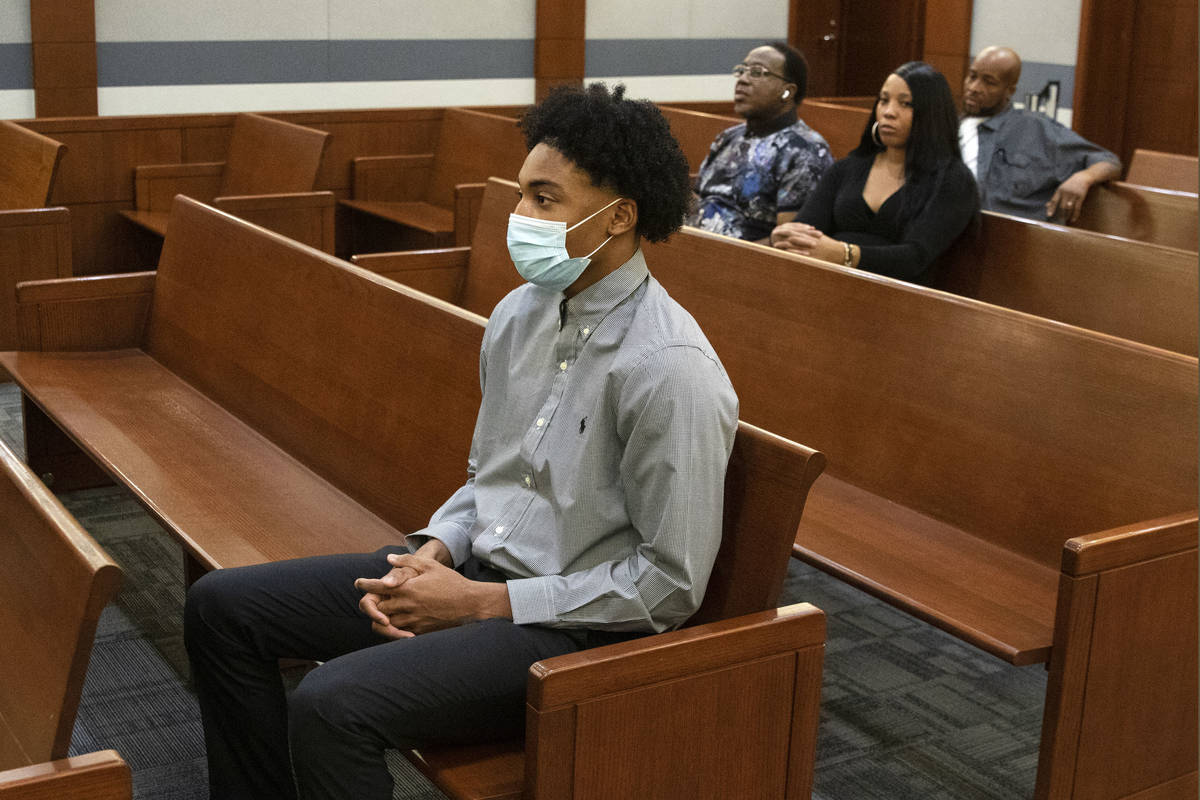Judge to decide on dismissal of charges against Zaon Collins

A Las Vegas judge said Thursday that she would decide in a week whether to dismiss a DUI case against basketball standout Zaon Collins in connection with a deadly wreck.
Collins’ attorney Richard Schonfeld argued that Collins was not impaired by marijuana at the time of a December crash that left Eric Echevarria dead.
The collision occurred near Fort Apache and Blue Diamond roads in southwest Las Vegas. Authorities have said Collins, 19 at the time, was driving his 2016 Dodge Challenger at nearly 90 mph in a 35 mph zone when he crashed into a 2016 Hyundai Accent driven by Echevarria, a veteran and an elementary school employee.
Echevarria, 52, died on the way to a hospital.
Las Vegas police said “a green leafy substance consistent with marijuana” was found near the driver’s seat of Collins’ vehicle during the investigation, and, according to a blood test, the basketball player had 3.0 nanograms per milliliter of THC in his system. The legal limit for drivers in Nevada is 2.0 nanograms per milliliter.
Schonfeld told Las Vegas Justice of the Peace Suzan Baucum that the amount of marijuana found in the vehicle was “scraps, almost dust” and that the level of THC in his system was so low that it could have been consumed days before the crash.
Chief Deputy District Attorney Eric Bauman pointed to evidence that showed that the drug could still have affected Collins.
“It’s still having an effect on (a driver’s) psycho motor skills, their ability to operate a motor vehicle safely,” he said.
Collins, who played at Bishop Gorman High School before he was recruited by UNLV, was charged with DUI resulting in death and reckless driving. The case was taken before a grand jury this year.
Members of the grand jury heard from a forensic scientist for the Metropolitan Police Department, who testified that there have not been enough studies to show when Collins might have consumed the marijuana found in his system.
“I would say that’s a low level comparatively speaking to what we usually find in other DUI samples,” the scientist, Nicole Vanaken, said of the suspect’s blood test results.
The grand jury in March declined to indict Collins on the DUI charge but approved one count of reckless driving.
In light of the grand jury decision, his lawyers, Schonfeld and David Chesnoff, asked the judge to throw out the case, arguing that Nevada’s law on driving under the influence of marijuana is “arbitrary and unscientific.”
Schonfeld argued that prosecutors acted in “gamesmanship and forum shopping” when they continued to pursue charges after the grand jury’s decision.
“They were already in District Court proceeding against Mr. Collins on the same allegations that exist in Justice Court,” he said. “They don’t get to dismiss that case and come back here.”
Chesnoff and Schonfeld have also shifted the blame on Echevarria, claiming video capturing the wreck showed Echevarria’s sedan attempting to turn between two vehicles.
“The video makes it clear that there was no room for Mr. Echevarria to turn without causing a collision,” the lawyers wrote in a 43-page motion to dismiss the case. “As a result, it was Mr. Echevarria that proximately caused the collision.”
Echevarria was an Army and National Guard veteran who grew up in New York City and had called Las Vegas home for about two decades. He is survived by his wife, a teenage son, four adult stepchildren, six grandchildren, a sister and an older brother.
Contact David Ferrara at dferrara@reviewjournal.com or 702-380-1039. Follow @randompoker on Twitter. Review-Journal staff writer Rio Lacanlale contributed to this story.